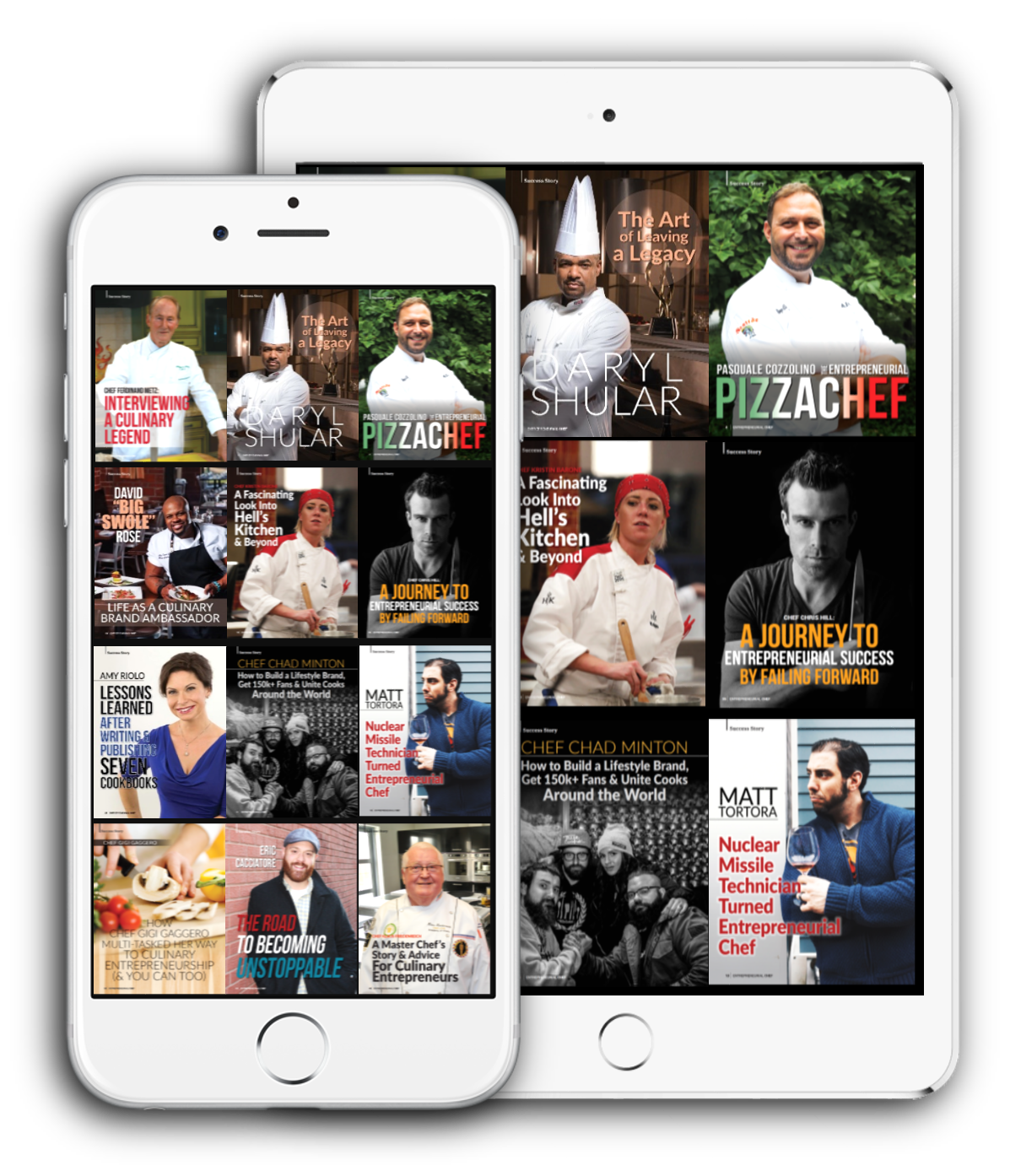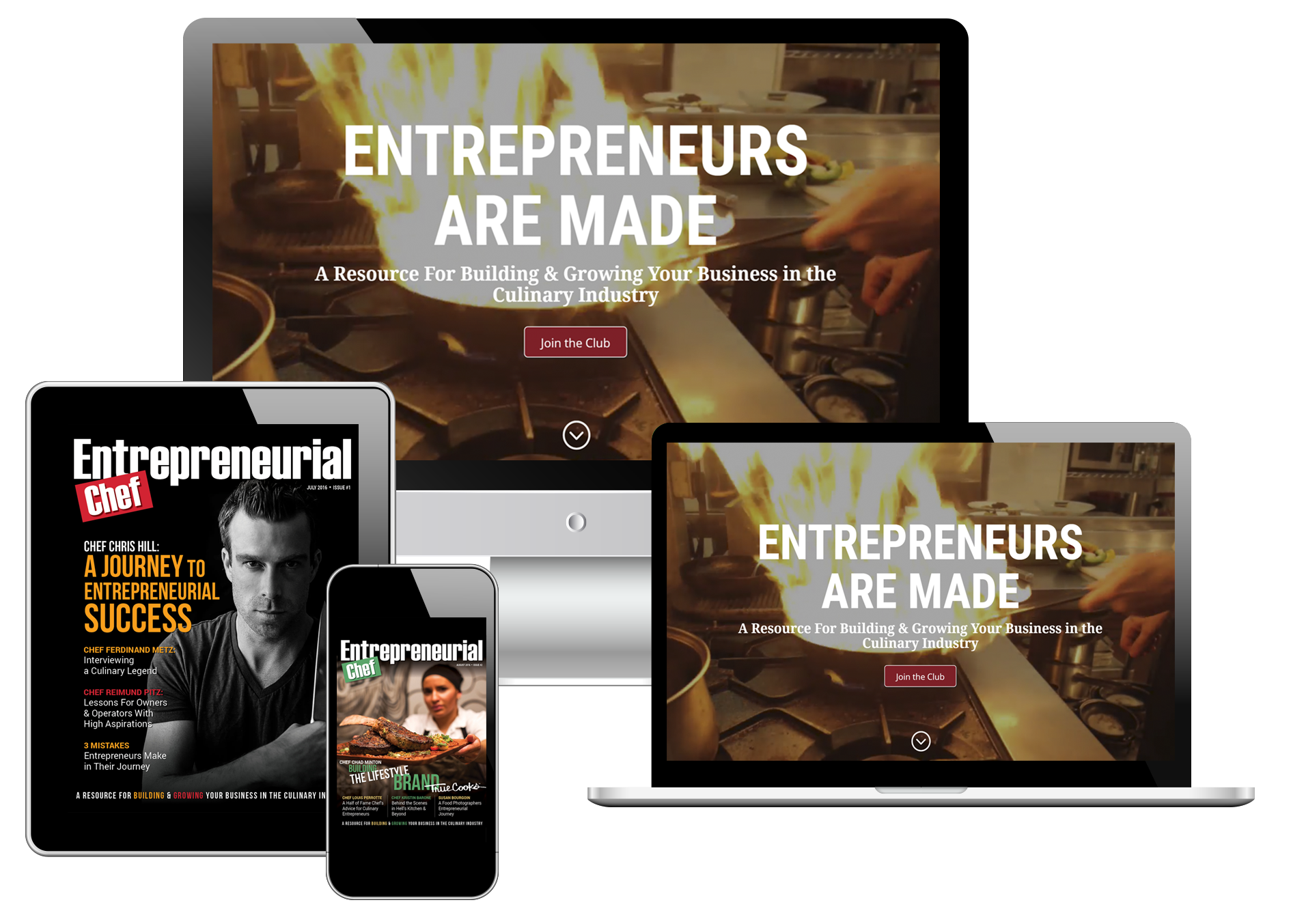MRM Talking With: Shawn Wenner, Founder of Entrepreneurial Chef
6 Min Read By MRM Staff
How crucial are entrepreneurial skills in establishing culinary success?
In this edition of MRM Talking With, Shawn Wenner, founder of Entrepreneurial Chef tells Modern Restaurant Management (MRM) magazine why he launched the brand, what he hopes to achieve and reveals some of his picks for “chefpreneurs.” Entrepreneurial Chef offers a mix of inspirational stories, ideas and actionable advice to help generate further ideas, create executable plans, develop growth strategies and more. Future plans include online courses, member-only forums, and special invites to live workshops centered around culinary entrepreneurship. To pay it forward, the magazine is offered free to culinary and hospitality students and educators.
What is your background in the culinary industry and other industries?
My introduction to the culinary industry was through Le Cordon Bleu College of Culinary Arts in Orlando. I began working in the admission department in 2005 and held various positions – Director of Admissions, Director of Retention, Etc. – while working at the college for close to a decade.

Shortly after beginning in 2005, I began seeing parallels between the industry I came from – music industry – and the culinary industry. I found individuals in the culinary industry to be driven by passion, very artistic, and rather eccentric, which are inherent traits of mine. It wasn’t long before I got the bug and fell in love with culinary arts, culinary education, and the passion displayed by all each and every day.
What is Entrepreneurial Chef?
Entrepreneurial Chef is a platform dedicated to culinary entrepreneurship. The leading resource is a digital magazine. Issues of the magazine are published monthly and they profile successful culinary entrepreneurs who share lessons and advice, while also including articles centered around culinary business and entrepreneurship. The magazine is available in app form in the App Store and Google Play.
Outside of the magazine, there is a website with a blog, online group, and soon are training guides and programs to help individuals in various stages of culinary entrepreneurship across a variety of niches.
Where did you get the idea for Entrepreneurial Chef?
After working in a culinary school for nearly a decade, I noticed a majority of students enter with high hopes and dreams of launching a business one day.
From restaurants to cafes, bakeries to food blogs, becoming celebrity chefs with cooking shows, and so on. Yet, I watched year after year graduates attempt to start a business or sustain a newly launched venture and they would fail time and time again.

It led me to conceptualize an entrepreneurial course for culinarians. One that would help them go from “idea to open for business,” and subsequently experience lasting success. As I built the program course by course, I realized a single course wouldn’t do the trick. It was at this juncture the idea of a platform with various legs as resources would begin the take shape.
What does the name mean to you?
Very simply, it’s someone in the culinary industry finding a way to monetize their experience and expertise. Even though the name is “Entrepreneurial Chef,” we work to profile chefs and non-chefs alike, providing they are entrepreneurs working in the confines of the culinary or hospitality industry.
What problems do you try to solve?
Primarily, the problem was a vast majority of aspiring culinary entrepreneurs – students coming from culinary schools – failing to launch the business of their dreams. Many of them stated financial reasons as being the problem, however, I come from the school of thought any problem can be solved with enough creativity. Therefore, it’s the purpose of Entrepreneurial Chef to profile entrepreneurs and businesses in the industry to provide examples for charting a path of entrepreneurship – even when money is a challenge.
Another problem noticed in the industry are chefs who age out of the kitchen without the any type of foundation in place for them to monetize their experience and expertise afterwards. With advancements in technology, there are ways to leverage digital platforms and create substantial revenue streams. However, many chefs are unaware or clueless how to use and leverage and create viable revenue streams (or full blown businesses) for themselves in unique ways. We work to educate in this area.
What was the process of establishing the business?
As with most businesses, everything began with a business plan. When you are looking to build something of importance, I believe in mapping out the various legs of the business. After creating the business plan, I began testing the idea with prominent chefs and professionals in the industry. My questions were positioned to uncover the value of a resource dedicated to culinary entrepreneurship.
Once I had substantial feedback from chefs and professionals in the industry, I began laying the groundwork to build the foundation. It started with the website, email subscribers, magazine, and then online group. Each layer was built as the previous one became sustainable.
How are you building awareness of the brand?
Social media has played a major role in building the brand. The best channel to date for building brand awareness has been Facebook. By far, we reach the most on that platform. Outside of social media, good ole’ fashion networking has been incredibly powerful. I believe in the digital era we live in; people forget the power of face-to-face networking. Personally, with my experience for many years in culinary education, I had a healthy amount of contacts. Such contacts became some of the first individuals to interview and subsequently help promote the brand.
Where do you see the business growing?
Currently, there is a lot of focus on the magazine. Each month there are more contributors and columnists who are coming on board and sharing great information. The readership is growing organically very nicely, more than expected actually. The goal is for the readership to continue growing first and foremost.

Separate from the magazine, the next phase is training guides and programs specific to niches in the culinary industry. These guides and programs will be designed to help individuals find new business ideas, launch their idea, or grow and scale their businesses.
Finally, in 2017 there will be the first Entrepreneurial Chef live event. The goal is to bring culinary entrepreneurs together and discuss ways to build and grow successful businesses.
What are some challenges you see facing the restaurant industry?
Outside of the minimum wage proposals and possible regulatory changes relating to workforce management, I believe technology will present a significant challenge. As technology has infiltrated nearly every industry, consumers are increasingly expecting advanced technological solutions in all aspects of their life – food service included. However, the food service industry has been traditionally slow to adopt technology. I see a divide as consumers expecting the gap to close quickly. I believe it will be a pain point for some food service businesses who are late to adopt solutions.
Secondly, I believe foodservice establishments are going to be challenged by the reduction of foot-traffic they typically get as more and more consumers increasingly shop online. Foodservice establishments who are especially close to shopping malls, retail outlets, etc., will be affected.
Finally, as platforms are created and refined that deliver ready-made food to consumers, I believe over time the restaurant industry will feel the impact. With companies popping up left and right who deliver food prepped and ready to heat, I believe more and more restaurant goers will opt for such convenience.
What are the most common challenges faced by chefs?
My experience is more with chef-entrepreneurs and their challenges are across the board. It truly depends on their experience, where they are in their career, and the type of business or brand they have.
Using the context of chef-entrepreneurs, I’d say common challenges would include:
- Having time to work on the business and not just in the business. The demands are tough and often come with little time to develop strategies to grow the business.
- Securing capital to launch a venture or expand. Even though I feel value and creativity can overcome money woes, it’s a shared challenge I hear about all the time.
- Knowing and executing marketing and advertising techniques specific to their business. When someone doesn’t truly know what marketing and/or advertising techniques are best for their business, they opt to try what others are doing. The danger is money being spent with abysmal results. Back to the demands of the business, there is often little time to spend learning how to best market and advertise for their specific business or brand.
Who are some of the best examples of entrepreneurial chefs?
Chris Hill is a great example of an entrepreneurial chef. After years of taking action day-in and day-out, he built a massive following, wrote a book, signed a second book deal, created programs to help culinary professionals, keynotes at schools and conferences, and continues to find ways to serve his audience authentically.
Chad Minton is another great example as the founder of TrueCooks. His goal was to create a lifestyle brand to unite professional cooks. It took emptying his bank account to create their first run of snapback hats, to which they sold out in a week. From there he inched his way to create a global brand while maintaining absolute authenticity and staying true to the brand’s motto of “Humility, Dedication, & Sacrifice.”

